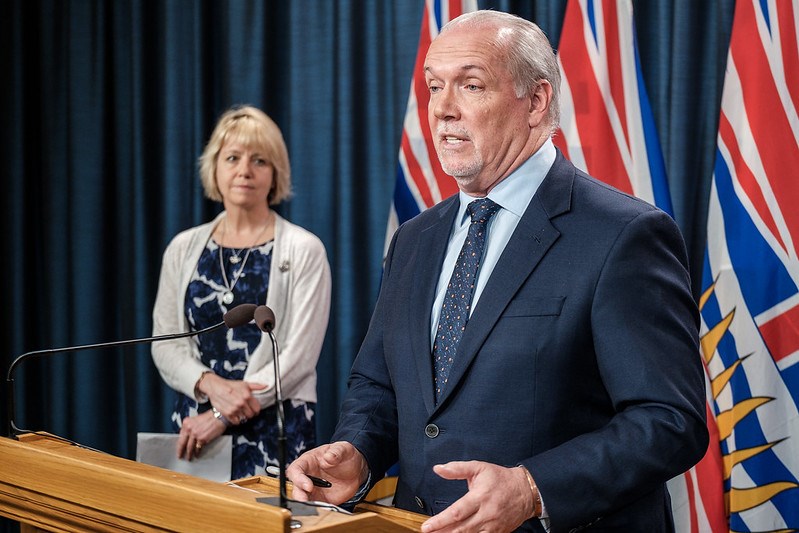The province is entering the third phase of its restart plan, Premier John Horgan said Wednesday, which means hotels, resorts, parks, the film industry and entertainment venues such as movie theatres will all be able to reopen.
Horgan emphasized the need to move ahead cautiously, saying: “This is not a return to normal.
“We need to remember we are not leaving COVID-19 behind.”
“It is here in every corner of British Columbia, and we need to behave accordingly. And we need to prepare ourselves not just as individuals, but our economy to manage that.”
Provincial health officer Dr. Bonnie Henry said people must continue to practise physical-distancing and take other precautions as we enter this “unique summer.”
“Even if we see more people and start to travel in British Columbia, we must still keep our circle small,” she said. “If we go too far, we risk a rebound and we will risk losing ground that we have worked so hard to get. None of us want that.”
On Tuesday, Henry showed modelling indicating British Columbians returned to about 65 per cent of normal activity during the second phase of reopening. For the most part, people are having safe contacts, Henry said. The number of people in hospital with COVID-19, which reflects the amount of transmission in the community, remains low.
“As we gradually transition into Phase 3, I ask everyone to please stay vigilant and do your part to keep our communities, our elders and our loved ones safe,” she said.
Businesses that reopen during the third phase will have to follow the guidance of public-health officials and WorkSafe B.C., said Horgan, noting many have already started opening with COVID-19 safety plans in place.
The third phase will also allow more opportunities for safe travel within the province, said Horgan.
The premier asked visitors to respect the “views and values” of people in the communities they visit. “That means making sure that the communities that you’re going to are prepared to receive you,” he said.
Horgan said many communities are concerned about receiving tourists, including the Haida in Haida Gwaii, the Heiltsuk in Bella Bella, the Nuxalk in Bella Coola, as well the Nuu-Chah-Nulth Tribal Council comprising 14 First Nations along 300 kilometres of west Vancouver Island.
Horgan said the government has contacted Indigenous communities and municipalities about Phase 3 plans.
But leaders of the Heiltsuk, Tsilhqot’in and Nuu-chah-nulth Tribal Council First Nations said on Wednesday that the province’s failure to consult on the reopening and provide adequate COVID-19 safety measures “puts Indigenous lives at risk.”
They said in a statement they will support each other’s efforts to restrict travel in their respective territories until safety conditions are met. The Indigenous leaders are calling for better information-sharing on suspected and confirmed cases with Indigenous governments in nearby regions, screening of non-residents, rapid testing prioritizing Indigenous and remote communities, and contact tracing where teams are staffed by community members.
The Heiltsuk, Tsilhqot’in and Nuu-chah-nulth Tribal Council have all enacted travel advisories, bans and checkpoints during the pandemic. More recently, the Nuu-chah-nulth Tribal Council unanimously voted to restrict entry to most of Vancouver Island’s west coast, including provincial and federal parks, until COVID-19 safety conditions are met. All 14 First Nations within the tribal council are independent, however.
“We have not given our consent to open up the province,” Judith Sayers, president of the Nuu-chah-nulth Tribal Council, said in a statement. “We will do what we need to in order to protect our people, and if there is an impasse, we need to talk. For us, it is people before economics.”
Henry said if people are visiting from outside B.C., the province needs to help them understand through signage and modelling that they must maintain a physical distance, exercise hand hygiene and keep circles of people small.
Non-essential international travel remains a no-go.
Spikes in the number of COVID-19 cases in the United States — Washington state, as well as Idaho, Oregon, Nevada, Arizona and California — are concerning, said the premier.
People living in these states just south of British Columbia often visit our regions, he said.
“That’s why it’s so critically important that we continue to work with the federal government to keep our international border closed, so that we can protect British Columbians, and not give up the ground that we’ve been able to accomplish over the past number of months.”
On Wednesday, Henry announced 14 new cases of COVID-19 for a total of 2,849 cases in B.C. to date, with 162 still active. Fourteen people are in hospital, including seven who are in intensive care. The remainder are at home in isolation.
Island Health reported no new cases on Wednesday, with total cases remaining at 131, of which 125 have recovered and five have died. One case remains active.
Provincewide, one new COVID-19 related death, in the Vancouver Coastal Health region, was announced, for a total of 171 deaths to date.
Six long-term care or assisted-living facilities and one acute-care facility have active outbreaks.



